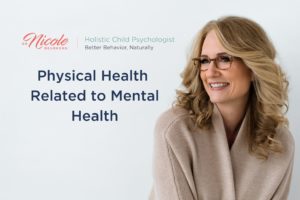In the past few weeks, I’ve had parents at my clinic report that educators have said the following to them about their children:
“Have you considered medication?”
“It looks like its time for a meds increase.”
“I think he needs medication.”
“Have you talked to the doctor about getting more medication?”
“If she was on medication this wouldn’t be an issue.”
As a teacher and psychologist, I am taking a stand and saying this needs to stop.
First, let’s clear up a misconception some educators seem to have about psychotropic medication. It is not a universal “fix” that makes a student’s learning or behavior challenges disappear. Even in the best of circumstances – when medication helps reduce symptoms – it does not solve the underlying problems. The reality is that many school-age children take medication that does very little to resolve their symptoms. There are more children than ever before on prescription psychiatric medications, and yet we have an ever-increasing number of students experiencing difficulties with learning, socialization, and behavior in school. If medication was the solution, these problems would have been solved long ago.
Education professionals are trained in educational theories and techniques – not medicine or therapy. Making suggestions or recommendations about medication is completely outside the professional bounds of educators. Nonetheless, some do not hesitate to tell parents to get medication for their child, even going so far as to make specific recommendations about what they think might work. This is inappropriate, and potentially dangerous.
Research has shown that educators have a very limited knowledge of psychotropic medications. If they have any knowledge about these medications at all, it is generally in regard to stimulants and SSRI drugs (Ryan, Reid, & Ellis, 2008). Educators report that they often make recommendations regarding stimulant medication in particular, but admit to having very little information regarding these medications (Kasten, Coury, & Heron, 1992). A study of teacher knowledge regarding ADHD and medication treatment demonstrated that teachers know far less than would be expected given how large a role they play in the diagnosis and treatment of conditions such as ADHD (Snider, Busch, & Arrowood, 2003). In fact, many education professionals believe that psychotropic medications resolve a far broader range of symptoms than is actually supported by research. These studies support the idea that educators should refrain from suggesting medication in general, or making specific recommendations regarding medication treatment.
If educators have input regarding a child’s symptoms or challenges in school, then they should present those concerns in a supportive way to parents who can then raise the issue with the child’s physician. Educators have the opportunity to observe children daily, and their input can be helpful for prescribers responsible for medication management. Providing written documentation that can be taken to a physician appointment where medication initiation or changes may be discussed is also appropriate. It is not, however, acceptable to request dose changes, make recommendations to medicate, or tell parents to ask about specific medications.
It is too often the case that educators ask parents to consider medication without ensuring that appropriate educational supports are in place. I understand that students who present challenges in the classroom make things more difficult for teachers and other school professionals. However, educators are charged with providing an appropriate and supportive learning environment for all students. This sometimes means that many different approaches and strategies need to be implemented, changed, and honed over time. Medication is not a substitute for educators doing what they need to do for students in school. If parents choose to medicate their child then that is an additional support above and beyond appropriate interventions and strategies in the classroom. Instead of subtly or overtly asking parents to medicate their child, focus on sharing ideas as a team (including parents) that can best support students at school. Perhaps Snider et al. (2003) say it best when they conclude that “all educators should remember that there is no substitute for a well-conceived educational program that effectively addresses a child’s complete academic and social needs.”
Finally, I would ask educators to consider the message these types of questions and comments send to parents. They convey that educators don’t know what to do with the child, don’t want to look at non-medication supports, or believe the parents are not executing good judgment about the child’s treatment. As a professional working with families of children with a wide range of attention, mood and behavior challenges, I can say that most parents find these kinds of comments from educators insensitive and insulting. They assume that parents have not looked into options to support their child, and this could not be further from the truth in the majority of situations. Most parents whose children are struggling in school have looked into many available options, including medication. Some parents do not want to medicate their child, and prefer to utilize other treatments. Others have medicated their child, and symptoms do not improve. Parents may have discussed medications with their child’s physician, but discovered that they are not an option for one reason or another. Some parents end up medicating their child because they feel bullied by school professionals, and don’t feel that they have other options to help their child get through the school day. Whatever the case, it is insulting for educators to assume that parents have not explored appropriate intervention options, or are incapable of making appropriate treatment decisions for their child. Instead of asking about medication specifically, it would be more appropriate for educators to ask what parents have investigated, and what they can do at school to be supportive of the options parents have chosen for their child.
I understand that there can be a wide variety of motivations for educators to discuss medication treatment with parents. Most enter into these discussions with the desire to help the child perform better at school. However, even in these cases there can be underlying feelings of incompetence or frustration on the part of educational professionals that drive these conversations. Educators should be focused on providing objective information to parents about how their children are functioning at school, as well as information about the supports being provided. Discussions between education professionals and parents should highlight the strengths and challenges of children, and the strategies and approaches that can best support them in the school setting. Educators should allow parents to drive whatever conversations may happen regarding medication, and stick to what they know best – providing quality educational opportunities for all students.
References:
Snider, V.E., Busch, T., & Arrowood, L. (2003). Teacher knowledge of stimulant medication and ADHD. Remedial and Special
Education, 24(1), 46-56.
Kadten, E.F., Coury, D.L., Heron, T.E. Educators’ knowledge and attitudes regarding stimulants in the treatment of attention
deficit hyperactivity disorder. Journal of Developmental & Behavioral Pediatrics, 13(3), 215-219.
Ryan, J.B., Reid, R., Ellis, C. (2008). Special educators’ knowledge regarding psychotropic interventions for students with
emotional and behavioral disorders. Remedial and Special Education, 29(5), 269-279.
What You Should Do Next:
Sign up for my Better Behavior Naturally community newsletter
Sign up for my newsletter to get tips, resources, and supports to improve your child’s attention, anxiety, mood, and behavior…while making your job as a parent easier.
Enroll in one of my workshops
Check out one of my many workshops where you’ll join my exclusive community of parents in a one-of-a-kind virtual resource accessible 24/7. Whether you’ve got a child with a diagnosis like autism or ADHD, or are becoming more and more frustrated with a child who struggles to listen and cope, these workshops are designed to give you the information, tools, and support you need…whenever you need it.








